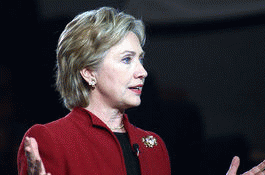Cross-posted from Campaign for America's Future
In Hillary Clinton's absence, Bill -- her husband, frequent proxy and former head of the party -- appears to be waging a rhetorical war on populism. If she doesn't share his anti-populist opinions, now would be a good time to say so.
The "Fiscal" Oldies
Is "anti-populist" a fair description of Bill Clinton's position? This week alone offered ample evidence. Exhibit A is the former president's by-now perennial appearance at conservative billionaire Pete Peterson's "Fiscal Summit," a propaganda event designed to convince a poverty-ridden, wage-stagnated and unemployment-stricken nation that its most urgent priority is convincing the government to do even less about these crises.
And let's not forget the other elements of the "fiscal summit" plan: cutting Social Security and Medicare for the middle class while at the same time lowering taxes for the wealthy. That's anti-populism in a nutshell right there.
I've covered these dismal "summits" before[1] and it's a depressing task. This year I'll outsource the task to the worthy Alec MacGillis at The New Republic, who writes that these events "are riddled with moments of elision, hypocrisy or outright dishonesty that are allowed to pass unchallenged by complaisant moderators."[2]
Indeed.
Although Clinton was the day's big draw, the "Summit" website indicated that only 173 people were watching his remarks online. That's not hard to understand. Viewing one of these events is not unlike watching an over-the-hill oldies band rheumatically sleepwalk its way through "Stairway to Heaven" and "Barracuda" for the thousandth time to a hotel bar filled with drunken business travelers. The songs have lost whatever meaning they once had for the listeners, and from the sound of it the band feels the same way.
But the rich guy's paying so they keep on playing.
Clinton dutifully pitched terrible ideas like a "repatriation" tax cut for offshore corporate profits, saying "we have to unlock this money" somehow. (Since corporate profits are at record levels, and the actual taxes collected for those corporations are quite low, a better way to unlock the money would be to close some corporate loopholes.)
He pitched other anti-populist ideas, too, especially where Wall Street's concerned. "Getting rid of Glass/Steagall didn't have anything to do with the crash," he said. "Nobody has identified a single bank that failed because of the repeal of Glass/Steagall. Not one. Lehman Brothers was an investment bank and Bear Stearns was an investment bank."
This is disingenuous in the extreme. It's true that no Too Big to Fail banks went down during the 2008 crisis. But that's because the federal government rescued them, at great cost and within an enormous distortionary effect on the economy. Why did the government do that? Because they were too big to fail!
The too-big-to-fail problem was exacerbated by the Clinton administration's own actions, especially in creating Citigroup (where a number of Clinton and then Obama officials then enriched themselves). Worse, the banking bill that Clinton signed left the vault doors open for a decade of unregulated fraud and mismanagement -- which he argues could not have been predicted, but which a number of people did predict at the time.
Hey, it's a start.
Then there was the anecdote about President Clinton that Tim Geithner told earlier this week, where he says he asked the former president how he might "pursue a more populist strategy."
"You could take Lloyd Blankfein into a dark alley," Clinton said, "and slit his throat, and it would satisfy them for about two days. Then the blood lust would rise again."
(Note: You can view every article as one long page if you sign up as an Advocate Member, or higher).






